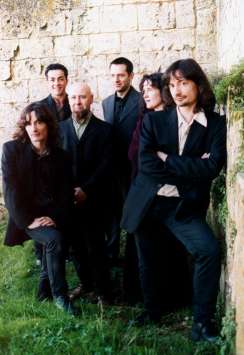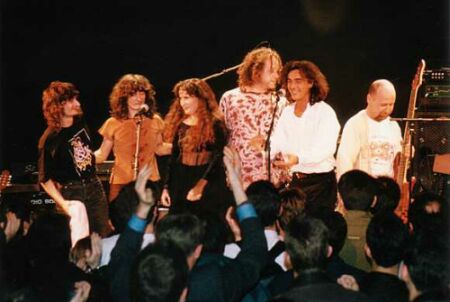Interview

(Progressive Newsletter Nr.49 08/04)
excerpts from an interview with Jean-Luc Payssan (Guitars) and Thierry Payssan (Keyboards)
JL: Yes youíre right, "Atlas" was a very pleasant album to make, even if it took a long time and a lot of work. We wanted to catch a certain light in the music. We had a lot of positive energy and we wanted that joy to appear in the record. Maybe we were happy just to play together again. We recently played on stage and I felt the same way. I was also surprised to see people dancing on our music ! But this strong spiritual joy always have been a part of Minimum Vitalís style. We always wanted to make music that makes people feel good. Iím not talking of course of superficial, commercial dancing music, but of a strong spiritual joy, in the Yes manner. That kind of joy, that ďdancingĒ style with medieval, folk influences makes Minimum Vital sound differently than other bands I think.
Musically ďAtlasĒ has overall the typical Minimum Vital sound. Do you have any special recipe for composing and arranging music or does it come out this way just naturally?
Th: I think with years, we've developed a certain way of writing music, and it has now became a natural way. There are some elements of style that we often used, that we hope to be our own. But since we've created Vital Duo, I must admit that we feel a certain distinction between the duo and the band, so when we begin to work on a piece of music for the band, the way to do it is different : we get on to it with different sounds and rhythm in head, as we have drums, bass, vocals, and the duo is very different, with a more original "instrumentarium". In the future, I would like to be able to merge all this, and imagine music with a larger view in the choice of sounds. Not necessary with "rock" drums for example, something more special.
How do you manage that the imaginary lyrics fit to the music? Does the music or the lyrics come first?
JL: Iíve never considered myself as a songwriter. Personally, I compose melodic lines first, on which I try to put interesting and dramatic modal chords. Then the ďwordsĒ naturally come secondly by using a kind of vocal improvisations, - I prefer to say musical incantations - that have to fit perfectly with the mood of the song. As you said, itís a totally imaginary language with touch of Spanish, Portuguese, Latin, etc. I donít know exactly where it comes from. Weíve certainly been influenced by Magma, but as twin brothers and at an early age, Thierry and I always used to create strange unmeaning words that other people couldnít understand ! So itís always been a natural process. If you want the truth : to me, unmeaning words have sometimes more to say than ďrealĒ lyrics, maybe because they point out something that lies behind words, something that is more universal.

How do come up with the titles of the song, as they are not necessarily a part of the lyrics of the song? Is there a meaning hiding behind them?
Th: It's curious sometime how the titles come. Very often, the title seems to appear by itself, it's not a choice ! Other times, the piece has still no title, and we use a temporary name, which is a joke between us like "volubilis", wich was found by our drummer Didier, as we first presented the song saying that it was a "voluble" track (volubile in french). In the end, the title remains. But, even if the titles have no hidden meanings, they are often chosen for their poetic qualities. We like the words to be strange sometimes.
This time you even choosed some songs to be sung in ďrealĒ language, even one song in english. Is this a new lyrical approach or do you just want to try out if itíll work with your music?
JL: Yes, we tried to sing in English in "Voyage 1", because we felt that it simply would fit better with the music. In this particular case, we just wanted to write short poetical lines that would give a luminous feeling to the listener. But the lyrics in this song are very short and humble, you know. Once again, the words have been chosen more for the sound than for the meaning, and itís the same for Icarus, which is sung in French. We donít want to tell a story really, but to suggest visions. I donít think weíre going to use more real lyrics in the future. The imaginary language we created is an important and deep part of our style, and we still have a lot to explore with it.
Is it a big advantagefor you that you donít have the pressure of a record company that forces you to release an album every year?
Th: In a certain way maybe, but the problem is that nowadays, you have only two alternatives: being a big star and known by a huge quantity of people, or being nothing ! Of course, there are some exceptions, but It's a pity that there is no possibilities for a "reasonable" or "medium" success. We don't want to be "stars" ! We're only honest musicians trying to create a personal musical sphere, so the only thing we look for is selling just enough copies of an album to do the following, I'm not even talking about living with doing only music ! And for the moment, this is not the case: doing the next album is still difficult from a financial point of view.

Is Vital Duo more than a side project or was it just created to fill up the musical vacuum during the break with Minimum Vital?
JL: No, Vital Duo was not created to fill up a vacuum. In retrospect, Vital Duo was a necessity. After "Esprit díAmor" and the live album "Au cercle de Pierre", we needed to make a break and try new things, we had to explore. So the answer was Vital Duo. I consider now that the Duo is the most creative and important thing weíve ever done, and "Ex Tempore" is probably our best album to date. This project opened so many musical doors ! Now, the challenge for the future is to bring the ďVital Duo spiritĒ in the band. Thatís what we intend to do, and we have new music yet that goes that way.
Last year youíve released a DVD that contains also Minimum Vital material from 1994 that had already appeared on video. Any chance to record a DVD with the current line-up in the near future?
Th: I'm afraid it's always a problem of money. Doing images for a DVD can cost a lot of money in terms of production, time we have to spend on it, and so onÖ For the first one, we had the chance to work with our friend Gilles Pialat, who has done a big work, and put plenty of energy in the project, with just a little remuneration. We cannot do that twice. Of course, if we can have enough copies sold of "Le Jardin Hors Du Temps", maybe we would think of making another one, as that kind of work is very motivating for us, but until now this is not the case!
Are there also other projects at the moment youíre contributing in?
JL: Yes. Minimum Vital is working actually on a 20 mn long piece of music for the Odysseus project. The aim is to create music to illustrate a chapter of The Odyssey. The project will join nine bands together. Each band will have to illustrate a chapter of the whole story. Itís a dazzling adventure and itís very inspiring. We have composed the music yet, and we intend to record it this summer. The album will be released by Musea at the beginning of 2005. Iím also contributing to the publishing of the two Philippe Cauvin albums, that were never edited on CD. Philippe Cauvin was the leader of Uppsala, a mythic French band who dared to mix progressive music, jazz and contemporary music. But Philippe Cauvin is above all an innovative acoustic guitarist who created for classical guitar a unique style: a strange mix between rock, medieval and contemporary music. The meeting of Steve Hackett and Olivier Messiaen! Moreover, Philippe Cauvin added to the six strings of his instrument a seventh one: a sensual counter tenor voice singing an imaginary language full of strangeness and spirituality. He made two fantastic albums: "Climage" (1982) and "Memento" (1984). They are two masterpieces, and Iím very proud to contribute to their new release. Moreover, I intend to do a solo project: an acoustic album based on classical guitar, lute and voices. It will be very inspired by early and medieval music, and will be ready by 2005 I hope
Kristian Selm © Progressive Newsletter 2004